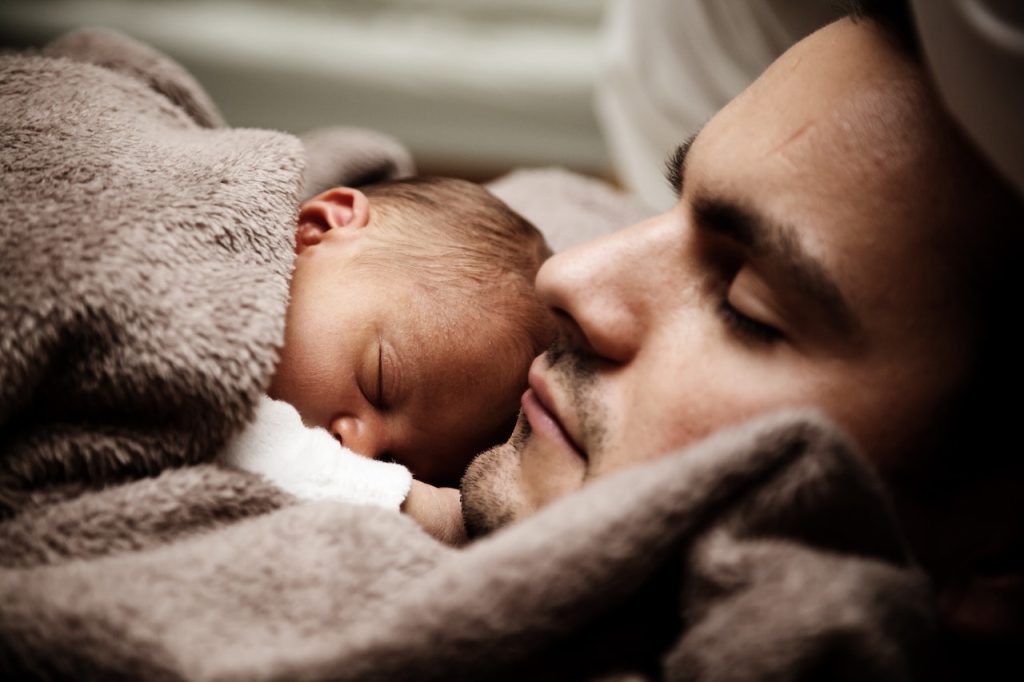
Your experience with your newborn is not one you’ll ever forget. As a first-time parent, you may not have all of the necessary information for caring for your newborn, so we’ve provided everything you need to know below.
Table of Contents
Handling a Newborn

Source: unsplash.com
Handling a newborn for the first time can be a scary experience. They are so small and fragile that it can be very intimidating. However, eventually, you’ll get used to having them in your arms.
Before handling a newborn, you’ll want to either wash your hands or use a hand sanitizer. Newborns don’t have the same immune systems as we do yet, so they are at a higher risk for infection or developing a cold. You and everyone else who is handling your baby should have clean hands.
When carrying your child, you need to support their head and neck, as they don’t have the strength to hold it up themselves. Cradle the head of your baby and support it when carrying the baby or laying your baby down. Never shake your newborn for any reason, because this can lead to bleeding in the brain or death. There are other ways to play with or wake your child; you can gently blow on them or tickle their feet.
Newborns need to be protected from rough movement. When buckling them into a car seat or stroller, ensure that they are securely fastened.
Bonding and Soothing
Parents need alone time with their newborn to develop bonds; in the first few hours and days after birth, parents make deep connections with their newborn, and their physical closeness can help build an emotional connection. This attachment is essential for infants’ emotional growth because this affects their development in other areas. Bonding can be achieved by cradling your baby and gently stroking them, and you can also be skin-to-skin when feeding or cradling your newborn.
Newborns need soothing; some can be sensitive to sound, light, or touch, and they may cry easily. In these cases, noise and light levels need to be kept low to moderate. For other newborns, talking, singing, and other vocal sounds can help soothe them, as well as baby rattles and Musical mobiles.
Swaddling

Source: mom.com
Swaddling is a soothing technique that works very well for some newborns during their first few weeks; it is a technique that all first-time parents should learn because it can make the soothing process much easier. Proper swaddling will keep the baby’s arms closer to their body but allow movement of their legs. Swaddling can help keep a baby warm and give them a sense of security and comfort.
To swaddle a baby:
- Lay out the receiving blanket, having one corner slightly folded over.
- Gently lay the newborn face up on the blanket, with their head above the folded corner.
- Grab the left corner of the blanket and wrap it over the body, tucking it underneath the right arm and beneath the back of the baby.
- Bring the bottom piece of the blanket over the feet of the baby and towards the head, folding if it’s too long and gets too close to the face. Try not to wrap it too tightly.
- Grab the right corner and wrap around the baby, tucking it under the left side. This leaves only the neck and head exposed.
To make sure the baby isn’t swaddled too tight, make sure there’s enough space for you to slip a hand between the blanket and the newborn’s chest.
While this is an effective soothing technique, it should not be used for babies two months and older. Once babies reach this age, they can move a little on their own and can roll over. If swaddled, this can lead to sudden infant death syndrome (SIDS).
Diapering
When diapering, you’ll have to choose between disposable or cloth diapers, and each has its own pros and cons. Regardless of which option you choose, newborns require diaper changes up to ten times a day.
When diapering, you want to have all of your supplies within reach before you put your infant on the changing table. This will ensure that your child is not left unattended. Gently wipe your child’s area with washcloths, gentle wipes, water, or cotton balls. If your child is female, white from front to back to avoid a UTI, and when removing the diaper of a male child, you have to be careful because the exposure to air can cause him to urinate.
Try to apply ointment after every diaper change. Diaper rash is a concern, and though it goes away in a few days, it is uncomfortable for the child.
Bathing

Source: healthline.com
Bathing your newborn child can be intimidating. For the first few weeks, your newborn should be given sponge baths. The circumcision, for boys, takes one to two weeks to heal, and the navel heals completely in one to four weeks. For the first year, a baby only needs a bath two or three times a week.
You can clean your baby using a sponge bath, which is gently wiping them down with a soft washcloth. When they are old enough, they can be placed in a small tub with shallow water.
When cleaning your baby, you want to use natural baby cleaning products.
Dressing
From spit-up accidents to Leaky diapers, babies can go through more than one onesie on an average day. While some may not give much thought to what clothing their baby is in, why not choose organic options?

Source: newsweek.com
Organic vs. Inorganic
Organic clothing has some benefits. They offer the same benefits as conventional clothing but are missing in the chemicals that are used during processing. This causes less irritation for your baby’s vulnerable skin.
When washing your baby’s clothing, you want to use natural baby cleaning products like the products offered by Grab Green Home.
Feeding and Burping

Source: healthline.com
When feeding your newborn, you have the option of a breast or bottle. Babies should be fed on demand, and they may show you that they’re hungry by crying, making sucking noises, or putting their fingers in their mouths. Newborns need to be fed every 2 to 3 hours, and some may need to be awakened to make sure they are eating enough.
While feeding, babies swallow air, which makes them fussy and uncomfortable. Every time you feed your baby, try to burp them.
Sleeping

Source: pexels.com
Surprisingly, newborn babies sleep for 16 hours or more, usually for periods of 2 to 4 hours. They are woken up in between naturally or for feeding, but otherwise, they spend most of their time sleeping.
When placing your baby down for sleep, always settle them on their backs. This reduces the risk of SIDS. Also, try not to include any toys, pillows, or blankets in the crib or bassinet; keep the baby’s bed as clear as possible. And while it is recommended to share a bedroom for the first six to 12 months of a baby’s life, never share a bed. From night to night, change the positioning of your baby’s head so that they don’t develop a flat spot.
Taking care of a newborn can be anxiety-inducing in the beginning, but soon you will fall into a routine like a natural. Don’t worry; any fear you have is shared by other first-time parents with newborns.







